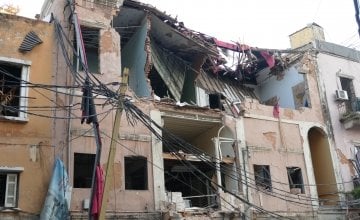
Read our 2023 annual report

Knowledge Hub
The humanitarian impact of the Beirut explosion

Lebanon has already been facing an economic crisis, an influx of refugees, and a new spike in COVID-19 cases. This means that recovery from the August 4 explosion in Beirut will be daunting.
Before Tuesday, August 4, Lebanon was already at an impasse. It’ is in the throes of its worst economic crisis in recent history, which has only been exacerbated by the COVID-19 pandemic. 33% of the country’s population lived at or below the poverty line last September — that number is now estimated to be approximately 45%. The country’s unemployment rate is now just above 30%. It is also host to the greatest concentration of refugees per capita in the world (over 20% of its population).
However, this week’s massive explosion in Beirut — Lebanon’s capital and main port city — has led to a more immediate emergency: More than 300,000 people have been left homeless, and over 5,000 injured. These injuries come on top of the ongoing coronavirus pandemic, placing additional stress on the country’s medical and healthcare resources.
A daunting recovery
The scale of the recovery challenge is daunting given the level of injury, devastation to homes and essential infrastructure, and the underlying poverty and economic crisis
While the full scope of impact of this event is yet to be determined, the Beirut explosion is an example of how an emergency can further stress an already complex humanitarian situation. Here are just a few of the humanitarian impacts of this explosion, and how they fit together.
Medical response and the ongoing effects of COVID-19
As one healthcare official told the press the day after the explosion, “We need everything to hospitalize the victims, and there is an acute shortage of everything.”
The explosion at the Port of Beirut destroyed one of the city’s main hospitals and damaged many other healthcare facilities, forcing many patients to be evacuated and creating an increased demand for beds in other nearby facilities. Some medical supplies were already in short supply due to the coronavirus. Beirut has had the highest concentration of confirmed cases of COVID-19 in the country and had just last week implemented a new lockdown to control a second spike in infections.
The Port of Beirut also handled 80% of Lebanon’s food and medical imports, which means that getting supplies into the country now — and, more importantly, to where they are needed most in its capital — will involve contingency plans, such as delivering through the smaller port of Tripoli in the north (approximately 90 minutes away by car).

Shelter and essential needs
In the immediate aftermath of the explosion, it’s estimated that as many as 300,000 people cannot live in their homes, which further complicates the order to shelter in place. For those who can stay in their homes, there is also the concern that the explosion will further challenge infrastructure basics like electricity. Two of the most common hashtags for Beirutis on social media this week have been #ourhomesareopen and #بيوتنا_مفتوحة, offering spare beds and sofas to those who have been displaced, but long-term solutions will be necessary. For Beirut’s large refugee and migrant population (including many women who are live-in domestic workers without a support system in Lebanon), the housing situation is even more precarious.
Food security is also a concern, in a year where the Food and Agriculture Organization has already predicted increased levels of hunger due to issues including the pandemic. The explosion also damaged the country’s largest grain silo, and the FAO fears a flour shortage for the country as a result. The economic crisis has more than doubled the price of basic food staples between the end of 2019 and the middle of 2020, which also could mean that Lebanon’s poorest and most economically vulnerable people will suffer the most.
Psycho-social support
“In a country which suffered a 15-year-war up to 1990, explosions trigger trauma,” explained Concern Lebanon Country Director Catherine Whybrow.
Lebanon’s recent history combined with this explosion creates a mental health challenge for hundreds of thousands of Beirutis, including an estimated 80,000 children. While many affected by the blast may not have sustained physical injuries, the long-term effects of explosions are shown to include post-traumatic stress disorder.
Left untreated, PTSD from these experiences could lead to chronic conditions including anxiety, depression, or addiction, as well as negative coping mechanisms. In turn, these conditions can seriously limit a person’s potential or quality of life.

Avoiding a humanitarian crisis
Concern has worked in Lebanon since 2013, where we first established programs in response to the Syria crisis and where we have since been responding to the increasing humanitarian needs in the region for both refugees and host communities. Our team is in place to assess local needs and ensure that Lebanon’s most vulnerable people have access to clean water and the hygiene and sanitation measures that are especially vital to protect against COVID-19.
We will also focus on providing shelter to Beirut’s poorest communities whose homes were damaged or destroyed in the blast. As Concern’s Humanitarian Advisor Dom Hunt points out, upgrading substandard shelters will be vital before the wet and cold weather arrives in Lebanon in the coming months. “As long as we can get funds, we have the staff and the resources to make an immediate real difference to alleviate suffering,” added Hunt.
You can support Concern’s work in Lebanon to help the country’s most vulnerable people to recover from this disaster and avoid further risk.

Other ways to help
Corporate support
Is your company interested in working together for a common cause?
Fundraise for Concern
From mountain trekking to marathon running, cake sales to table quizzes, there are lots of ways you can support our work.
Buy a gift
With an extensive range of alternative gifts, we have something to suit everybody.
Leave a gift in your will
Leave the world a better place with a life-changing legacy.
Volunteer with Concern
The lots of ways to get involved with our work as a volunteer
School fundraising
Without the generous support from schools, we wouldn't be able to do the work that we do.




